|
Our guest speaker this week is Rev. Dave Mason.
Gathering Around the Word
Prelude Bob Senay ANNOUNCEMENTS CALL TO WORSHIP Leader: One: God gives us one day at a time: People: Long enough for laughter to follow tears; Leader: Deep enough for prayer and silence to pray together; People: Time enough to help someone in need; Leader: Plenty of time to notice beauty and praise the Maker; People: Sufficient time to build a bridge of forgiveness or tear down a wall of resentment; Leader: The right time to embrace friends, smile at strangers, play with children, sing praise to God. People: Praise God for this day we are given. INVOCATION Rev. Mason
HYMN 738 O Master, Let Me Walk with Thee
CALL TO CONFESSION Let us confess our sins before a merciful God: PRAYER OF CONFESSION (UNISON) Lord, forgive us for not realizing the kingdom of God unfolds in open places. Forgive us for not realizing that the empty places in body and soul are the fertile soil for new growth. Forgive us for filling our lives to capacity, failing to recognize what is missing. Forgive us for not seeing that the ache of love lost is witness to the seed planted. Forgive us for not appreciating the pain of grief, for the fullness of love is woven with sorrow. Forgive us for the rejection of others who keep us mindful of that beyond. Bless you for giving us the harmony of life in the Spirit, for we will recognize true abundance. Amen. *Time of silent prayer. Assurance of Pardon In Jesus Christ, we are forgiven. Alleluia! Amen. *Passing the Peace L: The peace of the Lord Jesus Christ be with you. P: And also, with you. *Response – Gloria Patri CHILDREN’S CHAT The Word of God Prayer for Illumination Scripture reading MATTHEW 5: 1-12 L: The Word of the Lord P: Thanks be to God ! Sermon “ A BLESSED LIFE” Responding to the Word HYMN 731 Give Thanks for Those Whose Faith *Apostles Creed Presentation of our tithes and offering Offertory Prayer of dedication Prayers of the People Rev. Mason The Lord’s Prayer HYMN 824 Near to the Heart of God Postlude Bob Senay
BIRTHDAYS: Ida Reese, Debbie Rugg, Helen Provenzano, Cheryl Bell
ANNIVERSARYS: Ed & Carol Horne SYMPATHYS: To the Family of Frank Baker on the passing of his sister. To the Family of Marvin Cutright. ANNOUNCEMENTS: Remember our food Collection. And Jesus said, “You give them something to eat.” Please let Betty Fisher know of anyone within the Community that may be in need at this time. Please remember, if there is anything you want on the Joys and Concerns page let me know by Wednesday night. You can email me at [email protected]. Hi everyone, I would like to schedule a meeting next Thursday, February 2, to talk about restarting the choir. If you know of anyone else who might be interested, please let them know they can come as well. I was thinking of holding it during the day since I am off work that day, but if you want to meet later, we can do that. I’m thinking about noon, but I’m open to whatever time fits most schedules. Let me know. Thanks, Don Herschell CONTINUING PRAYER LIST Melissa Pedigo, Aaron Blake, Chuck Dicks, Tim Knabenshue, Frank Huffman, Tom Westfall, Elaine Belcascro, Sandy Stone, Matt Petrola, Nancy Hepinger, Sarah Wilson, Bill Poland, Carl Weber, Jimmy Svetz, Betty Fisher, Haley Diedier Bedillion, Fred Wilkinson, Evelyn Wood, Brandon Bell, Ricci Amos, Milton Rice, Nancy Diaz, Gianna Perry, Marlene McFeely, Tiffany Cipoletti, Robert Paxton, Bill Berdine, Cheryl Bell,Diane Anderson, Jim Durila, Jeff Durila, Larry Litman, Sue Gregg, Doris Ann Rowe, Susan Strope, Tim Taylor, Suzy Smith, Helen Provenzano, Jean & Ron Westfall, Lori Doxtator Walker, Frank Baker, Chuck Horton, Ruth Buterbaugh, Ed Horne, Donna West, Carol Knabenshue, Mike Diedier, Richard Wagner, Ruby Hathaway
0 Comments
Good morning!
We are so glad you decided to join us today!
When we meet in person, we share our joys and concerns together. Take some time to consider the last week. If you have any prayer requests, you can add them as a comment to this post. When you are ready, use the prayer below (source) to get started.
Father, Son, and Holy Spirit, holy is your word. Perfect are your ways. Let us be blessed by your word today as we mediate on your precepts. Your promises are true. Your word is faithful. Let us walk in the path of your word today. We pray the words of our mouths come from YOUR truth. Let our thoughts be governed by YOUR commandments. Please bless this day as we seek to dwell in your word today. Amen.
Today's lesson is on Joel 2:21-27.
There are three chapters to book of Joel. Joel directed his prophetic message to the people of Judah and the city of Jerusalem. The book opens by describing a plague of insects that destroyed the crops of Judah. The once fruitful land of Judah became barren by the destructive insects. Because of the land's desolation, the people of Judah lived in famine and in want. Joel interpreted the destruction as the consequences of Judah's sin, and he called his audience to return to the Lord and repent.
The Lord saw the turmoil in the land and the suffering of his people. Through the people had sinned, he had compassion for them. The Lord was “jealous of his land” and showed “pity” on his people. He demonstrated his care by promising his people renewed sustenance and protection from foreign enemies. His renewal would cause his people and their land to prosper. Because of his compassion, his greatness would be on display for his people and the whole world. God had done great things for the people as they came out of bondage in Egypt. God would continue to do for his people and their land. Joel described how the beast of the field moan and pant because of the destruction of their habitats. Fire, drought and swarms of insects had destroyed the land; the pastures and the fields have laid in waste. The land was uninhabitable for all of creation. However, the Lord's great work of Restoration would come to the creatures of the land – they have no reason to fear. The Lord's restoration of the wilderness reflects the connectedness among God's creation. Only a fruitful land can sustain animals livestock and humans. Centuries later, Jesus taught that God provides for all his creation, even the smallest animals. Previously, vines were wasted and dried up, while the bark of the fig trees were stripped, leaving the trees to decay. However, the land's restoration brought renewed provision for the people. A fruitful vine and fig tree showed that the people lived in safety and flourished. An ideal and good land easily supported grapevines and fig trees. The agricultural renewal would bring about a settled population and would mark the end of the season of destruction. Because of the Lord's restoration, the people would experience joy and gladness, feelings that were lost because of the turmoil. God showed his righteousness and justice to his people by allowing the return of the rains, thus bringing an end to the drought. When the people returned to God, his justice would be fulfilled, and he would show compassion. By promising a return to consistent rainy seasons, God showed he is faithful to care for people and their land. He would treat his people rightly, as his justice poured down on the people and led into salvation, The people would see tangible examples of the Lord's blessings. The restoration followed God's history of working wonders for his people. Though the people experience harsh and dehumanizing treatment while living as slaves in Egypt, God dealt miraculously with the Egyptians to free his people. God demonstrated his covenant love to his people – despite their sinfulness- though marvelously kind ways. At the center of the relationship between God and the people was the reality that God was present and active in their midst. When their suffering was reversed and they saw the renewal of their land, they would know that God was present as he promised. The uniqueness of this relationship was exclusivity. No other god could rightly claim Israel's allegiance and worship. God's presence with his people led to their rejoicing for his mercies. The people were to live without fear of being shamed, because the King of Israel was in their midst.
Conclusion
A plague of destruction insects with the accompanying feelings of terror might be incomprehensible to modern audiences. Therefore, the feelings of joy from God's promised renewal might seem equally as foreign. However, modern audiences of Joel's prophecy can take away two applications. First, the text serves as an ancient reminder regarding a present reality; the importance of maintaining hope during seasons of suffering, Joel's words, directed to a people in the midst of hardship, reoriented their expectations. Disaster and shame changed to flourishing and celebration, all because of God's great work of renewal. Joel promised the people that hope was possible in the midst of disaster and suffering. Although sin brings consequences, God will not ignore or disregard his people. Instead, God can bring joy to replace sorrow. His timetable may not be ours and he may not immediately bring joy or fix our suffering. However, his people can take comfort in knowing his presence. Second, this passage serves as a reminder of God's promises to renew all creation. Joel promised that not only would the people be restored, but creation – the land and the animals - would also be restored. God's plan of restoration is not only focused on the spiritual realm but also the physical realm. All things – spiritual and physical - belong to the God who created them. Joel calls us to embrace all aspects of God's restoration and renewal. As a result, God's people of all eras can celebration his presence in their midst. Prayer Heavenly Father, we trust that you will bring restoration to our world, despite our sinful actions and inactions. Renew us so that we might better follow and praise you. Show us how to live as your people, free from shame. In Jesus' name. Amen. Questions:
Benediction
This week's benediction is from the World Messianic Bible.
Next week's lesson will be on 1 Corinthians 1:18-31.
Our guest speaker today is Rev. Renny Domske.
Prelude Music Director Bob Senay
ANNOUNCEMENTS: Call to Worship: Psalm 23 The Lord is my Shepherd, I shall not want. He makes me to lie down in green pastures. He leads me beside the still and quiet waters, He restores the strength in my soul. He leads me in paths of righteousness for His name’s sake. Even though I walk through the valley of the shadow of death, I will fear No evil, for You are with me. Your rod and Your staff bring me comfort. You prepare a table before me right in front of my enemies. You anoint my head with oil, and my cup overflows. Surely goodness and love will follow me every day of my life, and I will dwell in the house of the Lord forever.
* Hymn “O God, Our Help in Ages Past” #687
Prayer of Confession (unison) Great God, You are so faithful to us; Your promises are sure and certain; You bring us comfort. Yet Lord, we confess that our promises are unsure and wavering; Our moods and our commitment to You change like the weather. Forgive us, Lord Help us to be people who make promises and keep them. Help us to be people of Your word and our word. Forgive us our sins. We thank You for giving Your life and death for us and proving Your word by Your resurrection. * Time of silent prayer *Assurance Of Pardon: L: The peace of the Lord Jesus Christ be with you. P: And also, with you! Response – Gloria Patri (page 581) Passing the Peace Children’s Chat Prayer for illumination Scripture reading: Romans 15: 1 – 7 ll Timothy 3: 1 – 5, 10 – 17
Sermon: “Let’s Go Fishing!”
*Hymn “Open My Eyes, That I May See” #451 *Apostles Creed (copy next to prayer list) Presentation of our tithes and offering Offertory *Doxology (page 606) *Prayer of Dedication Concerns and Celebrations Prayers of the People The Lord’s Prayer *Hymn “Guide Me, O Thou Great Jehovah” #65 *Benediction * Postlude
Good morning!
We're so glad you decided to join us today!
When we meet in person, we share our joys and concerns with each other. If you have prayer requests to share, you can add them to the comments on this post. When you are ready, use this prayer to get started.
God of grace and mercy, we turn to you again as people who want to be closer to you and live as your children. Help us to remember that righteousness is not simply a matter of attending worship or Sunday school or going through any particular religious ritual. It is a matter of how we live and work and give in the world around us, and especially how we care for the poor and the oppressed in our community. Help us to live as children of light.
In Jesus’s name we pray. Amen.
This week's lesson is on Isaiah 58:6-10.
Introduction
The practice of fasting is confusing for many Christians, partly because we don’t hear much about it these days and partly because Christians can fast for different reasons at different times. Some may even consider fasting to be a practice of a bygone era when it comes to spirituality. According to the Presbyterian Church (USA), fasting is for repentance and mourning for our brokenness and sin, for seeking the will of God, for preparation for baptism of catechumens or new believers, and for preparing to receive God’s Word made flesh in the paschal mystery of Easter. We can find examples of all of these purposes throughout the Bible, but the thing that unites them all is a recognition that from time to time we need to focus intently on our sinfulness, our need for God, and our need to hear God’s word and to act in response to that word. Fasting is a good practice for many times in the Christian life, but Lent is a season that combines all of biblical reasons for fasting. Lent begins on Ash Wednesday, which is February 22 this year. During Lent, we try to get away from the distractions of life, and instead we focus on the basics, on our own mortality, and we prepare to hear and accept God’s word, particularly God’s Word made flesh, Jesus Christ. It is a deeply personal and introspective time, but it is also a time that allows us to look around us and see the needs of those who struggle to fulfill the basic needs that we may take for granted.
Lesson context
If you look at examples of fasting throughout the Bible, you will see it happens at times when people want to express deep sorrow, when people are expressing repentance, and when they have a deep desire to receive God’s word. From Moses’ 40-day fast before receiving the Law on Mount Sinai to Jesus’s 40-day fast in the wilderness to prepare for his ministry, fasting is a time of self-denial and preparation. Fasting is something that communities and entire nations can do to show their need for God’s intervention. But for those who approach fasting with the wrong motive and attitude, there is a danger that it can be done only for show. In Matthew 6, Jesus warns people not to fast in this way, not to make your fast obvious to those around you just to gain attention. That kind of fasting is insincere and goes against the true purpose of the practice. Isaiah must have seen something similar happening in his day. If you read the verses that come just before our passage for this morning, you will see that the people were fasting but they were not experiencing God’s presence or hearing God’s word. They wanted to know why. Isaiah’s answer is that they were going through the ritual of fasting, but it was not affecting their treatment of the poor and needy. They were fasting, but they were allowing injustice to continue and the poor to go hungry and naked. A fast that does not produce change within us that leads to change around us is not the kind of fast God intends.
God’s Chosen Fast (verses 6 and 7)
Our Sunday school lesson suggests that the people who were fasting during Isaiah’s time were not actively pursuing righteousness and real change but were merely taking a break from the evil habits they otherwise enjoyed. After all, the lesson points out, unscrupulous and unrighteous acts were (and still are) one way to become and remain wealthy or powerful. When Isaiah suggests the people fast by loosing other people’s chains and breaking their yoke, perhaps he was inviting them to see how they were benefitting from the injustice and pain that others in the community were experiencing. Perhaps the people of Isaiah’s time were not even fasting from their usual unjust behavior. Maybe they were simply going through the ritual of personal prayer and fasting while at the same time doing those things that contribute to the injustice and poverty around them. There is a real danger, even today, in separating our personal piety and service to the church from our way of living and doing business in our daily lives. Although we normally associate fasting with giving things up, it can also be a way of focusing on doing positive things. When I was growing up, people would often talk about taking the money saved from the meals we did not eat and donating that money to a good cause. During a fast, we may also use our time to do something positive for others in the community. Isaiah describes all of these practices in terms of lifting the burdens of others and setting slaves free. In fact, part of Isaiah’s call to fasting is “to share your food with the hungry and to provide the poor wanderer with shelter — when you see the naked, to clothe them….” This is the kind of fast God requires of us, a fast that not only sets aside our own daily needs but that gives us the opportunity to lift the burdens of others. During this time, we need to see that everyone in our community is, in a sense, our family and therefore they are people that we should not turn away when they are in need. Not all of the problems that people endure in society are because of systemic oppression. Sometimes, for example, people become homeless because they have untreated mental illness, addictions and simply because they experienced catastrophic financial losses. Many are elderly and without a real family support system. Regardless of how they have come to this situation or why they are unable to emerge from it, as Christians we are obliged to see them and to try to lift their burden.
A Bright Future (verses 8-10)
Isaiah’s prophecy is not just to pronounce gloom and to point out sin. It is also to assure the people that, if they commit to a fast like the one the Lord intends, they will experience God’s presence and they will become the people God wants them to be. Isaiah casts this change as moving from darkness to light. Not only will God’s light break forth on them, but they also will be people of light. Their light will shine into the world. It reminds us of the prologue to the gospel of John, where Jesus’s arrival is seen as light coming into the world. And even though not everyone accepted that light, and some tried to snuff it out, those who accept it, become children of God. In Ephesians, Paul calls such people “children of light.” Not only are Christians people who have seen the light. They are people who endeavor to live by that light and to share that light with others. If the people of Isaiah’s time would change their way of fasting and truly seek change within them and around them, they would receive healing as a people, both spiritual and physical. Isaiah assured them that they would enjoy God’s protection and God would answer their cries for help quickly. Sometimes when we feel God is not present with us or that God is not hearing or answering our prayers, it has more to do with our mental state than with God. At other times, even though God is always present with us, that sense of distance can be a call for us to examine ourselves and to bring our lives into God’s light so that we can receive forgiveness and righteousness. Again, fasting can allow us to remove the distractions and to focus on our relationship to God and how we are living as light in the world. In the case of the people of Isaiah’s time, it went back to the oppressive treatment of the poor. Isaiah calls them to stop pointing fingers and talking maliciously. Perhaps this refers to blaming particular people — or especially to speaking ill of and blaming the poor and oppressed themselves — for their situation. Perhaps Isaiah is telling everyone to take a look at themselves, to admit their own guilt and to change their ways. Isaiah concludes this portion of his prophecy by reminding his hearers that, by spending themselves in caring for the hungry and oppressed, God will indeed come to them, and they will shine like the sun at noontime. However, their fasts must be done with the right attitude, with real openness to change, and not simply for ritual or for show.
Conclusion
Isaiah pushed Israel to understand that what God deems important is not temporary willingness to fast from food but a spiritual health that leads to righteous behavior. So we might ask ourselves two questions: Do I go through ritualistic motions on a regular basis instead of allowing my heart to really be turned toward God during those practices? What “fast” might I need to undertake to align myself with the type of fasting God desires? A just and caring community will consider the “hungry” in all aspects Isaiah has already defined: food, clothing, and housing (Isaiah 58:7). How can we feel comfortable in our abundance if we know there is suffering in our neighborhoods? (1 John 3:17) It may be impossible for any one individual to meet every community need, but this does not excuse us from keeping our eyes open to the plight of others or striving to meet the needs we see. Experience has taught me that I am most successful with fasting if I practice it in community, with at least one partner. Then the limits of the fast are mutually agreed on and there is an accountability that helps keep me focused and faithful to the practice. Maybe you should seek a “fasting partner” who will share the experience and grow with you. That way you can grow in grace and truth together. (See John 1:14, 17).
Prayer
Lord God, give us hearts that seek a lifelong “fast” from the pleasures of sin and an ongoing “feast” of obedience to you. May we not be guilty of making a show out of our religious actions while having hearts of stone. Give us a character that cares about the needy, abstains from pointing fingers at others, loves and practices truth, and reflects the light of your Word. We pray in Jesus’ name. Amen.
Questions for discussion:
Benediction
This week's benediction is from the Revised Standard Version.
Next week's lesson is on Joel 2:21-27.
Our guest speaker today is Rev. Dave Mason.
Gathering Around the Word
Prelude Bob Senay ANNOUNCEMENTS CALL TO WORSHIP L: We Have come here to testify to Your love; P: Come to us, living God, and shine Your light. L: We have seen Your glory, full of grace and truth; P: Come to us, living God, and shine Your light. L: From Your fullness we have received every grace; P: Come to us; living God, and shine Your light in our darkness. INVOCATION Rev. Mason
* HYMN “Praise Ye the Lord, the Almighty” # 35
* PRAYER OF CONFESSION (UNISON) Gracious God, the disciples left all they had to follow the long-awaited Messiah. You promised them hardship, rejection, a loss of comfort, hostility, suffering and finally, a cross to carry. We worry when we cannot see where You are leading; we question “why” when suffering comes; and ignore the parts of the gospel that disrupt our sense of security. Forgive us, Lord. Forgive our selfish desire to have it both ways - to follow but at no cost; to claim You but not risk anything on Your behalf; to embrace new life without experiencing the garden of Gethsemane. Remind us that we live not for ourselves but for the world, in Your stead. By the power of Your Spirit, help us be Your disciples in the word and deed. Amen * Time of silent prayer *Assurance of Pardon *Response – Gloria Patri (Hymnal page 581) *Passing the Peace L: The peace of the Lord Jesus Christ be with you. P: And also, with you. CHILDREN’S CHAT The Word of God Prayer for Illumination Scripture reading John 1: 29 - 42
L: The Word of the Lord
P: Thanks be to God! Sermon “WHAT ARE YOU LOOKING FOR?” *HYMN “God of Grace and God of Glory” # 307 *Apostles Creed (copy next to prayer list) Minute for Mission Presentation of our tithes and offering Offertory Bob Senay *Doxology (Hymnal page 606) *Prayer of dedication Concerns and Celebrations Prayers of the People Rev. Mason The Lord’s Prayer *HYMN “Softly and Tenderly #418 *Benediction Postlude Bob Senay
ANNOUNCEMENTS:
Remember our food Collection. And Jesus said, “You give them something to eat.” Please let Betty Fisher know of anyone within the Community that may be in need at this time. The session will meet on the 23 of January at 7 P.M. There will be a congregation meeting on January 29 after church service. Covered dish dinner to follow church service, then back upstairs for the meeting. The congregation is asked to bring their favorite covered dish. Chicken will be provided.
CONTINUING PRAYER LIST
Melissa Pedigo, Aaron Blake, Chuck Dicks, Tim Knabenshue, Frank Huffman, Tom Westfall, Elaine Belcascro, Sandy Stone, Matt Petrola, Nancy Hepinger, Ed Horne, Sarah Wilson, Bill Poland, Carl Weber, Jimmy Svetz, Betty Fisher, Haley Diedier Bedillion, Fred Wilkinson, Evelyn Wood, Brandon Bell, Ricci Amos, Milton Rice, Nancy Diaz, Gianna Perry, Marlene McFeely, Tiffany Cipoletti, Robert Paxton, Bill Berdine, Cheryl Bell, Diane Anderson, Jim Durila, Jeff Durila, Larry Litman, Sue Gregg, Doris Ann Rowe, Susan Strope, Tim Taylor, Helen Provenzano, Suzy Smith, Jean and Ron Westfall, Lori Doxtator Walker, Frank Baker, Ruth Buterbaugh, Chuck Horton
Good morning!
We're so glad you decided to join us today!
When we meet in person, we take time to share our joys and concerns from the past week. If you have any prayer requests to share, you can add them in the comments to this post. When you are ready, use the prayer below (source) to get started.
God, open our hearts that we may love you; open our ears that we may hear you; open our eyes that we may see you; open our minds that we may learn of you; strengthen our wills that we may serve you; in the name of Jesus, Amen.
This week's lesson is on Isaiah 48:3-8, 17.
Lesson Context
The various sections of the book of Isaiah are unified by their repeating of important themes about the Lord and his relationship to Israel. The section we are looking at is Isaiah 40-55, which is sometimes referred to as Second Isaiah. It contains the so-called Servant Songs. Sometimes the servant is understood to be the nation of Israel, while sometimes it is understood as an individual to come. This section has some consistent messages. First, Isaiah points out the absurdity of worshipping idols. Second, Isaiah emphasizes that there is no other God but the Lord. Third, Isaiah frequently notes the Lord's knowledge and control of the future. Fourth, the role of the Lord as the Creator of all things is also prominent.
The Knowing God
The Lord asserted in no uncertain terms that he was the one who foretold the former things. God's plan was not haphazardly thrown together. However, promises can seem to take a long time to be fulfilled. Think of promises like Abraham becoming the father of a great nation, or the exiles in Babylon returning to their homes. But after God made them known, they did seem to happen suddenly. Israel's stubbornness is a common thread in the nation's history. This includes descriptions like being stiffnecked, of a hard heart, and refusing to hear or see. We also see the consequences of Israel's stubbornness. When the people refused to trust God after being delivered from Egypt, none of the first generation entered the promised land. The nation of Israel was divided into two kingdoms because King Rehoboam insisted on following foolish advice. Iron and bronze were the hardest metals known at the time of Isaiah. The description of a beast of burden as hardheaded as these metals was striking. An iron neck would not turn with the reins of the driver. The bronze forehead suggests a will so set that no new information or knowledge could cause a change of course. The passage repeats some ideas a few times. Repetition was a typical Hebrew writing convention. Whether word for word, with synonymous parallelism, or in other ways, repetition was used frequently to emphasize the importance of a point. Most of Isaiah's audience would have been illiterate, so words repeated over and over also helped to stick the message in the audience's heads. Attributing any action to an idol is ridiculous. And yet, Israel fell into this trap time after time. God wanted the people to admit that God had told them what was to come. Even after witnessing these things, the people were unwilling to admit it. Because of this unwillingness, God would not tell them in advance. Our book says that this means there would be a novel act, being created now. It would be a display of God's creative power at any time according to his pleasure. This way, no one could possibly say that they already knew what was going to happen. A foundational principle for Israel's relationship with God was that Israel was to "hear." They were to believe that God was the one true God, and to love God with all their heart, soul and strength. Further, they were to teach what they heard to one another and their children. The act of truly hearing the Lord always has included obedience to what he commands. As we have read over and over, the people rebelled against this often.
The Living God
Between our two sections of text, God asserted that it was for his own glory that he had not already punished Israel for all their disobedience. However, he would also not leave Babylon unpunished for what the empire had done to Judah. The last section we are reading today opens with, "This is what the Lord says." This phrase is a very common way of emphasizing that God, not the prophet, is the source of the prophet's words. God is not often depicted as a teacher in the Old Testament, though it is talked about here. We learn and grow when we do the right thing, but we also can benefit when we learn from our past sins. The only wise pathways is following the Lord, living according to his teachings. God leads the people in the way they should go. In the New Testament, it is even more striking that Jesus claims himself to be the only way, the exclusive pathway to the Father. The book of Acts also refers to the Christian faith as the way. Our faith is the very way that we live.
Conclusion
The tragedy of Israel's history is that God had revealed many things to them: his law, his will for their nation, his choices of leaders, and so on. Despite the long history of such revelations, the nation often acted as though the people did not have ears to hear. Time after time, Israel ignored the Lord's directives and warnings. We have a major advantage: we are empowered by the Spirit to grow in our relationship with the Father and become more like Jesus each day. When we do so, we will be better able to hear warnings when we are following a way not set out by the Lord. And we will have ears hearing what the Lord is doing as he calls us to join his work. Listen for the call!
Prayer
Lord God, forgive us for the times we have been too stubborn to seek you and your will for our lives. Please give us ears to hear so that we can follow your way. All this we pray in Jesus' name. Amen.
Questions for Discussion
Benediction
This week's benediction is from the Psalter.
Next week's lesson is on Isaiah 58:6-10.
Today's guest speaker is Rev. Renny Domske.
Good morning!
We're so glad you chose to join us today!
When we meet together, we take time to share our joys and concerns. Consider your past week. If you have any prayer requests, you can share them in the comments on this post. When you are ready, use the prayer below (source) to get started.
Mighty Savior, give me strength to hold on to the great blessings and wonderful gifts You have given me. Especially the blessings of Your promises, Your presence, Your peace, Your guidance, Your healing, and the gifts of salvation, faith, hope, love and eternal life. May I never forget these blessings or fail to use these gifts, and may they always be to me a proof of Your gracious love. Thank You for all You have given me: thank You, Mighty Savior. AMEN
Today's lesson is on Isaiah 43:1-4, 10-12.
This text is God’s promise to Israel. As a result of turning away from God and refusing to repent, the nation of Israel has been divided into northern and southern kingdoms. The northern kingdom was captured and dispersed by the Assyrian Empire.
Because Judah was spared, the people thought it was a sign that God would never allow Judah to fall. Isaiah called the people to repent, return to God and become witnesses for God. Unfortunately, forsaking God for a false god erodes the knowledge a person already has, and prevents growth toward God. The people refused to listen to Isaiah.
Conclusion
Although Isaiah was not believed in his own time, his words were written down. His words were considered precious by God and were preserved throughout generations. Prayer Lord, give us hearts and minds to be true witnesses of your mighty world. Thank you for how you have revealed yourself throughout history. In Jesus’ name we pray. Amen. Thought to Remember Remember God’s works, and witness faithfully.
Benediction
This week's benediction is from the New Living Translation.
Next week's lesson will be on Isaiah 48:3-8, 17.
Our guest speaker today is Rev. Renny Domske.
Happy New Year!
Good morning! We're so glad that you've decided to start the new year by studying God's word with us!
When we meet together, we take time to share our joys and concerns. Consider your past week. If you have any prayer requests, you can share them in the comments on this post. When you are ready, use the prayer below (source) to get started.
Father God, we gather here today under your care and protection. Thank you for your lovingkindness that never fails us. We thank you for those with us, that you would guide our thoughts and actions to bring you glory. Strengthen us and fill us with your peace. May we love and serve each other as Jesus has shown us. Fill us with the Holy Spirit to do your good work on earth. Amen.
Today's lesson is on 2 Chronicles 7:12-22.
God Promises to Hear and Forgive
At the beginning of chapter 7 it describes how King Solomon prayed for the acceptance of the temple and fire came down from heaven and consumed the burnt offering and the sacrifices and the glory of the Lord filled the temple. This was a dramatic and visible proof of God's approval. King Solomon offered a sacrifice of twenty-two thousand bulls and one hundred and twenty thousand sheep. Each animal was ritually sacrificed and a portion was dedicated to the Lord and a portion given to the priest and the people. God still had to be honored through blood sacrifice, both of atonement and as a demonstration of fellowship with God. It had been said that no height attained, no work done, no blessings received is in itself sufficient to ensure our continuance in favor. Nothing but continued fidelity.
Verse 12 - 13
God choosing a permanent home within Jerusalem cemented the promised land as the place he had chosen for Israel. Until this point, God had been content with the tabernacle. The temple that Solomon built replaced the tabernacle as the center of worship in Israel, signified by the relocation of the Ark of the Covenant to the temple. The temple was important but the Lord was not dependent on the people having a temple in their midst for him to be present with them. God named some punishments for turning away from him. Drought is caused by an extended period of no rain. At the opposite end of this spectrum, we expect flooding, but locusts can also represent the devastation of very wet conditions. Locusts are a subset of grasshoppers. These insects experience a drastic change when heavy rains fall. Instead of being solitary creatures of little impact in their “grasshopper phase," the locusts enter a “gregarious phase,” finding each other and swarming crops in groups as large as tens of billions of the flying insects. They can destroy thousands of square miles of farmland, bringing famine in their wake. The last punishment that was mentioned was a Plague. We should note that hardships can and do occur without being punishment from God. We should be wary of those who declare such and such a disaster to be what “those people” had coming to them. Instead we all ought to repent of our own sins. Verse 14 The actions listed are necessary for the people to be renewed as those called by God's own name. First, humility allows us to acknowledge when we have wronged God and one another. There is something naturally humble in true prayer because it recognizes that the answers are not in self and they are in God. God promises something special to humble praying people today. Second, prayer can be specifically of repentance, but its true importance is in renewing the relationship with the Lord. Only God can replace the “heart of stone” to “a heart of flesh”. Everything we do in turning toward God is simply what opens the door for renewal. It wasn't enough to merely turn their hearts to God, they must turn their lives to God. Verse 16 The temple's consecration did not come about by the human rituals of prayer and sacrifice but by God's own divine action. By choosing to meet Israel at the temple, God made it holy. And while God would not literally live in this temple, allowing the temple to be associated with his Name meant he was tying his reputation to the temple and to his people who worshiped there. Adding that God's heart would be in the temple speaks both to the care and the attention that God would give his people. We can think of this in the parallel way that Christians are God's chosen temple. Our mode of conduct reflects on our holy God who has chosen us as his people and the dwelling place of the Holy Spirit. Verse 17 -18 David your father was an apt role model for Solomon. When David sinned, he humbled himself, prayed, sought God's face and turned from his sinful ways. For this reason, we see over and over again that God did not hold David's sins against him, even when the man experienced the effects of his failings. The promise to maintain David's family on the throne of Israel was both conditional and unconditional. It was unconditional in the sense that God would preserve the dynasty even when its rulers practiced idolatry and unjust behaviors. However, Solomon's own sins resulted in 10 of the 12 tribes being taken from his son Rehoboam. And when Judah fell to Babylon in 586 BC, the monarchy was destroyed. The failure of line was attributed to the kings' unfaithfulness. The land and people could be restored, but it would be several centuries before a new kind of king from David's line would take up the crown. How God chose to keep this promise to David was greater than anyone in the Chronicle's day could anticipate. Jesus would live as a man and be proclaimed in his rightful place as king over the entire world. Verse 19-22 This verse shifts from Solomon to the people as a whole. While all sin severs the relationship between Israel and God, the root of many sins is idolatry – allowing some non-god to take God's place. False gods' ways are never God's ways, and in fact these imaginary gods often demand or condone wickedness. Worshiping any God but the Lord violates the first two commandments and ensures that a people will be led farther to forsake God's decrees and commands. The result of Judah's continued idolatry was exile. There is a certain logic to this: if people desire to put something else in God's place, they may find that God allows them to have what they desire, knowing that it is not what is really needed. The sins of Israel polluted the land so God took the people away to allow healing to begin. 2 Chronicles 36:21. One consequence of exile would be finding that God's destroyed temple and by extension - his exiled people would become a byword and object of ridicule. Israel's exile would serve as an example of how God disciplines sinful people. If Israel obeyed, He would bless them so much that others had to recognize the hand of God upon Israel. If Israel disobeyed, he would chastise them so severely that the nations would be astonished at the judgment of God among His disobedient people, and they would know the Lord has brought calamity on them. This response emphasizes Israel's ingratitude for their deliverance from Egypt. Israel's core identity came from the Lord who chose them and liberated them from Egyptian bondage. Worshiping and serving other gods was a rejection of what God had done. Outsiders who saw what happened in Israel would explain it as a disaster from the Lord.
Conclusion – God's Forgiveness
While sin has consequences, often dire, neither sin nor its consequences can utter the final word about the relationship between chosen people and the choosing God. Even when sin seems to have ruined God's plan entirely – as with the apostasy of the Davidic line – we do well to remember that God's promise and plans move forward. The loss of David's kingdom led to the greatest gift of all: salvation through Jesus' blood, bringing us out of our exile in sin and into God's kingdom. We cannot anticipate how God will choose to work through our exilic experiences. Still, when asking for God's mercy, we must remember our own responsibility: to humble ourselves, to offer honest prayer, and to seek God's face as we turn from evil. He honors our repentance when we honor him. Prayer O God who hears and sees, to you we turn when our sins consume us. Please forgive and heal us. In Jesus' name we pray. Amen Thought to remember Repent to experience forgiveness and healing.
Questions:
Benediction
Our benediction today is from the New International Version.
Next week's lesson is on Isaiah 43:1-4, 10-12.
|
AuthorWe are a small, rural Presbyterian church in southwestern Pennsylvania. Archives
July 2024
Categories
All
|
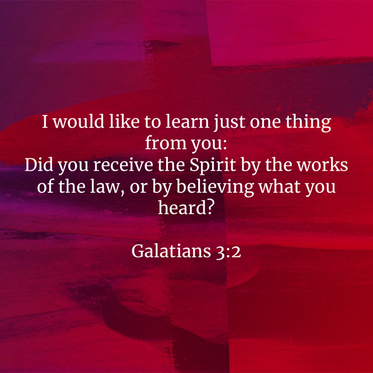
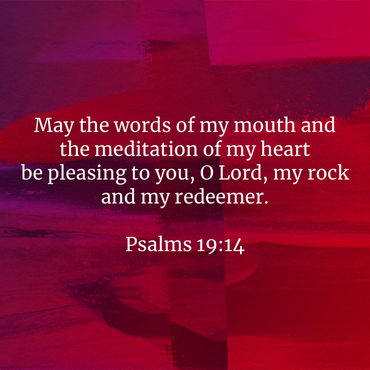
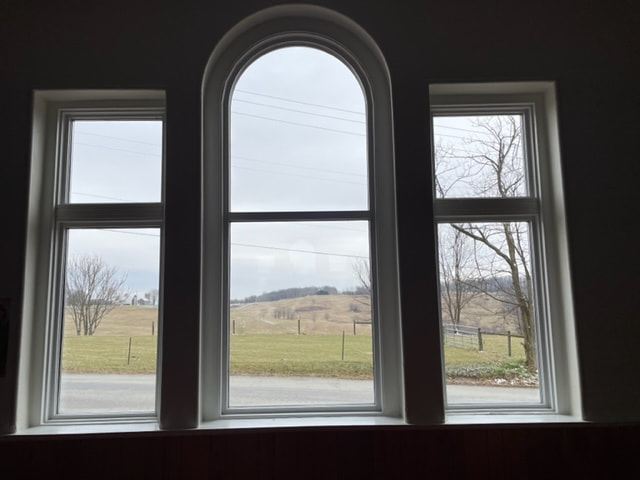
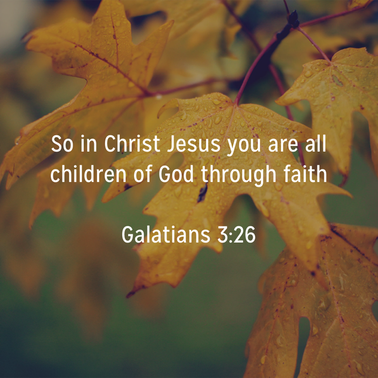
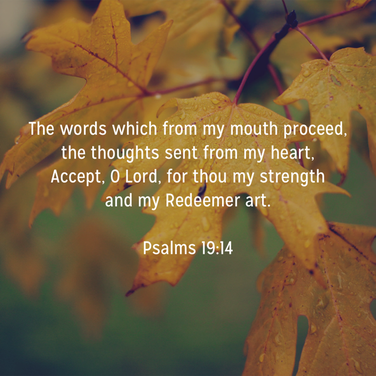
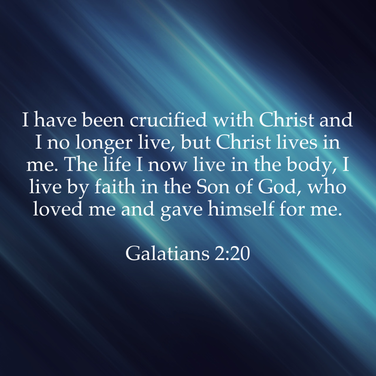
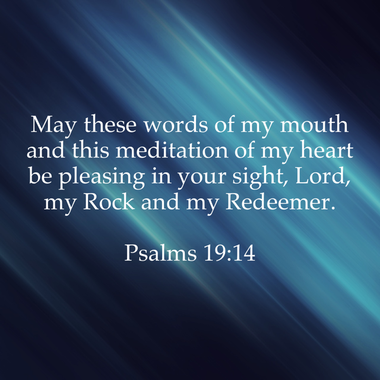
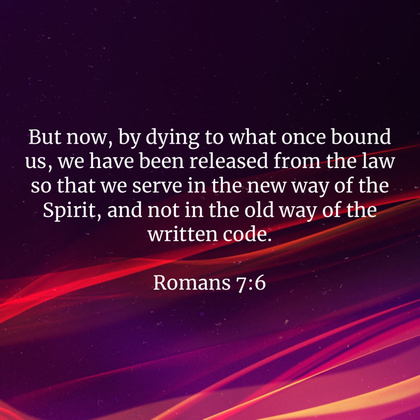
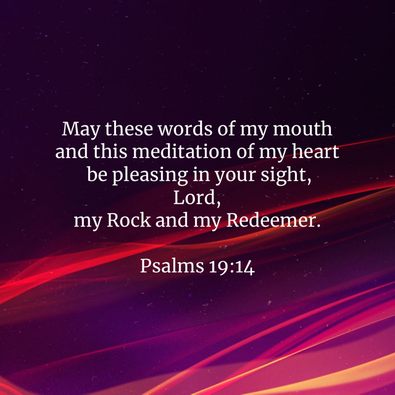
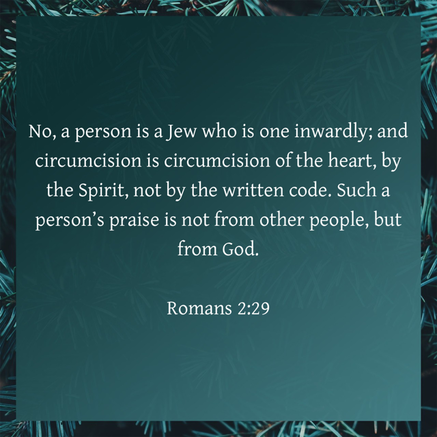
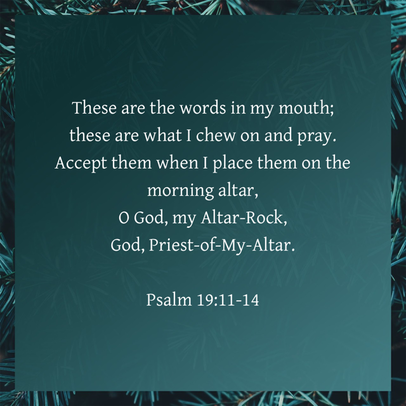

 RSS Feed
RSS Feed